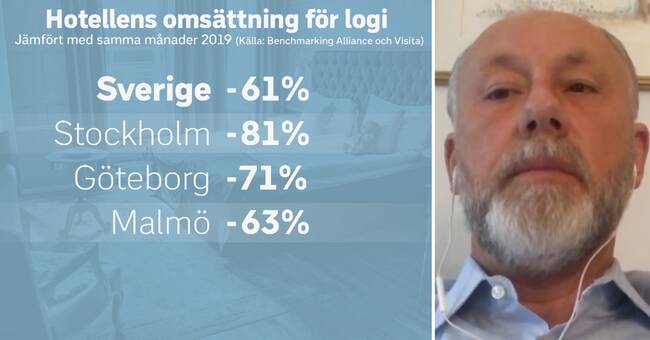Most people were prepared for the fact that it would be a tough summer for the hospitality industry.
But the fact that the hotel industry would lose as much as 61 percent of its revenue compared to June-August last year still came as a hard blow.
- It is the big cities that reduce the national figure.
They have definitely been the most affected during this entire pandemic, says Jonas Siljhammar.
Survived thanks to the restaurant guests
The worst has been in Stockholm.
There, the hotels have lost 81 percent of their revenue compared to last year.
In Gothenburg, they have declined 71 percent and in Malmö 63 percent, according to Visita's compilation.
- It is a combination of absent foreign tourists, closed tourist magnets and that people want to avoid the congestion of the city that has contributed to this, says Jonas Siljhammar.
At Waxholm's hotel in the Stockholm archipelago, most of the rooms have been empty for large parts of the summer.
By investing in restaurants and bar operations, they have still managed to stay afloat.
- I made the choice before the summer that all 65 employees would work full time.
It has worked because we had many local guests and sold more food and drink, says owner Therese Liljeqvist.
"From total despair to hope"
But autumn is an approaching cloud of unrest.
The major conferences that have been planned at Waxholm's hotels in the coming months have been canceled one by one.
Instead of overnight groups of 40 people, smaller lunch meetings are booked with up to 15 guests.
- I'm absolutely worried.
Should there be a large spread of infection again and there will be new directives, I have no resources financially to cope with this.
On Friday, the news came that the adjustment support for companies affected by the corona crisis will be extended to also apply to May, June and July.
Both Therese Liljeqvist and Jonas Siljhammar welcome the message but point out that it is only part of the solution.
- Total despair has turned to hope, but much will be decided by what the restrictions look like this autumn.
The adjustment support would need to be adjusted so that summer-dependent businesses that in many cases have lost all revenue this year can receive help with their expenses throughout the year, says Jonas Siljhammar.

